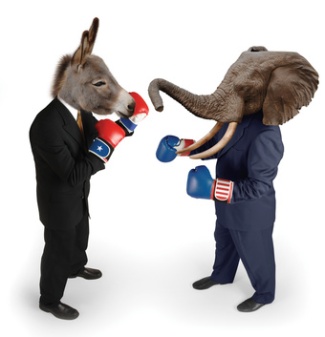 If there’s one thing we’ve learned watching the political circus here in the U.S., it’s that the battle over social issues is often a war of words. Does ‘marriage’ have to be between a man and a woman? Should it be ‘global warming’ or ‘climate change’? Is ‘gun control’ about regulating or eliminating gun ownership?
If there’s one thing we’ve learned watching the political circus here in the U.S., it’s that the battle over social issues is often a war of words. Does ‘marriage’ have to be between a man and a woman? Should it be ‘global warming’ or ‘climate change’? Is ‘gun control’ about regulating or eliminating gun ownership?
It’s no doubt that these have come to be loaded terms in our society, which makes the act of defining them for a dictionary a delicate task. Is there a way to capture the full meaning of a word without stepping on any sensitive political toes? Well, let’s look at how three definitive online dictionaries — Merriam-Webster, the Oxford English Dictionary, and the American Heritage Dictionary — handle gay marriage, global warming, and gun control.
Marriage
Merriam-Webster: (1) : the state of being united to a person of the opposite sex as husband or wife in a consensual and contractual relationship recognized by law (2) : the state of being united to a person of the same sex in a relationship like that of a traditional marriage <same-sex marriage>
Oxford Dictionary: (1) : the formal union of a man and a woman, typically recognized by law, by which they become husband and wife (2) : the state of being married (3) : (in some jurisdictions) a formal union between partners of the same sex
American Heritage Dictionary: (1) : the legal union of a man and woman as husband and wife, and in some jurisdictions, between two persons of the same sex, usually entailing legal obligations of each person to the other
The verdict? Well, all three dictionaries include same-sex marriage as part of their definitions of marriage. The American Heritage Dictionary includes same-sex marriage in its primary definition rather than as a secondary bullet point. But it qualifies it with “in some jurisdictions,” as does the Oxford Dictionary — the definitions focus largely on legality. The Merriam-Webster dictionary seems to take the strongest position that same-sex marriage IS marriage, although it also creates a distinction from traditional marriage. But if language is any indicator, times and attitudes are changing.
Global Warming
Merriam-Webster: an increase in the earth’s atmospheric and oceanic temperatures widely predicted to occur due to an increase in the greenhouse effect resulting especially from pollution
Oxford Dictionary: a gradual increase in the overall temperature of the earth’s atmosphere generally attributed to the greenhouse effect caused by increased levels of carbon dioxide, CFCs, and other pollutants
American Heritage Dictionary: an increase in the average temperature of the earth’s atmosphere, especially a sustained increase sufficient to cause climatic change
Interestingly, the American Heritage Dictionary steers clear of the controversial ‘why’ of global warming: Is it a man-made problem? Merriam-Webster’s definition is bolder, stating that global warming is a “widely predicted” phenomenon, “resulting especially from pollution.” But this definition suggests that global warming is something that’s likely to happen in the future, rather than something that’s already happening… The Oxford Dictionary definition takes the strongest position here, noting that the greenhouse effect is real, man-made, and “generally” believed to be the cause of global warming.
Gun Control
Merriam-Webster: regulation of the selling, owning, and use of guns
Oxford Dictionary: no exact results found for ‘gun control’
American Heritage Dictionary: regulation restricting or limiting the sale and possession of handguns and rifles in an effort to reduce violent crime
Merriam-Webster’s definition is short and sweet — gun control is about regulating guns, plain and simple. The Oxford Dictionary, on the other hand, doesn’t even define gun control (perhaps because in Britain, there is no powerful gun lobby and handguns and automatic weapons have been “effectively banned“). In this case, American Heritage’s definition provides the most context, connecting gun control to an effort to reduce violent crime caused by certain kinds of weapons.
So there you have it. This exercise isn’t meant to sing the praise of any single dictionary or try and point out potential bias — rather, it’s to show that cultural, editorial, and perhaps even subconscious factors all play a role in how definitions get written for dictionaries. It doesn’t mean that any of these definitions are right or wrong — on the contrary, they illustrate that language isn’t black and white. It’s always changing and adjusting, as we humans struggle to define the words that define us.
 California bill seeks to define ‘hot dog’
California bill seeks to define ‘hot dog’



